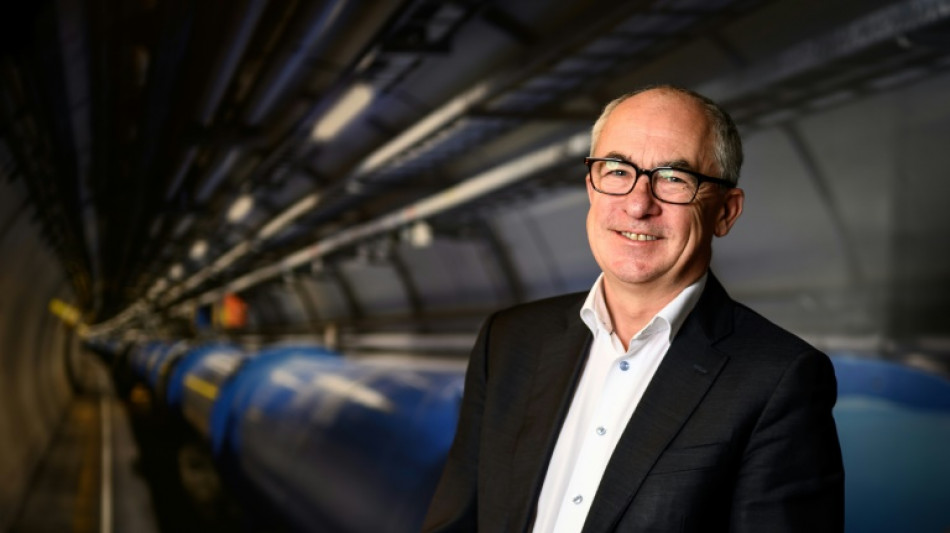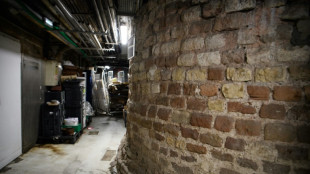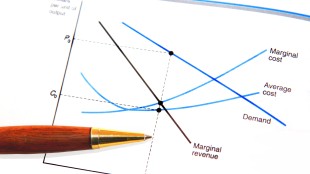
-
 Rubio chooses Central America for first trip amid Panama Canal pressure
Rubio chooses Central America for first trip amid Panama Canal pressure
-
Wall Street's AI-fuelled rally falters, oil slumps

-
 Trump tells Davos elites: produce in US or pay tariffs
Trump tells Davos elites: produce in US or pay tariffs
-
Progressive politics and nepo 'babies': five Oscar takeaways

-
 American Airlines shares fall on lackluster 2025 profit outlook
American Airlines shares fall on lackluster 2025 profit outlook
-
France to introduce new sex education guidelines in schools

-
 Wall Street's AI-fuelled rally falters
Wall Street's AI-fuelled rally falters
-
Drinking water in many French cities contaminated: study

-
 After Musk gesture, activists project 'Heil' on Tesla plant
After Musk gesture, activists project 'Heil' on Tesla plant
-
ICC prosecutor seeks arrest of Taliban leaders over persecution of women

-
 Syria's economy reborn after being freed from Assad
Syria's economy reborn after being freed from Assad
-
Shoppers unaware as Roman tower lurks under French supermarket

-
 Stocks mainly rise after Wall Street's AI-fuelled rally
Stocks mainly rise after Wall Street's AI-fuelled rally
-
Singer Chris Brown sues Warner Bros for $500 mn over documentary

-
 J-pop star Nakai to retire after sexual misconduct allegations
J-pop star Nakai to retire after sexual misconduct allegations
-
Leaky, crowded and hot: Louvre boss slams her own museum

-
 WWF blasts Sweden, Finland over logging practices
WWF blasts Sweden, Finland over logging practices
-
How things stand in China-US trade tensions with Trump 2.0

-
 Most Asian markets rise after Wall Street's AI-fuelled rally
Most Asian markets rise after Wall Street's AI-fuelled rally
-
Fire-hit Hollywood awaits Oscar nominees, with 'Emilia Perez' in front

-
 New rider in town: Somalia's first woman equestrian turns heads
New rider in town: Somalia's first woman equestrian turns heads
-
Most Asian markets extend AI-fuelled rally

-
 Bangladesh student revolutionaries' dreams dented by joblessness
Bangladesh student revolutionaries' dreams dented by joblessness
-
Larry Ellison, tech's original maverick, makes Trump era return

-
 Political crisis hits South Korea growth: central bank
Political crisis hits South Korea growth: central bank
-
Photonis Launches Two Market-Leading Solutions to Advance Single Photon Detection and Imaging Applications

-
 Les Paul owned by guitar god Jeff Beck auctioned for over £1 mn
Les Paul owned by guitar god Jeff Beck auctioned for over £1 mn
-
Musk bashes Trump-backed AI mega project

-
 Does China control the Panama Canal, as Trump claims?
Does China control the Panama Canal, as Trump claims?
-
Yemen's Huthis say freed detained ship's crew after Gaza truce

-
 Mel B, Trump and Milei: What happened at Davos Wednesday
Mel B, Trump and Milei: What happened at Davos Wednesday
-
Argentina's Milei says would leave Mercosur for US trade deal

-
 Fashion world 'afraid' of Trump, says Van Beirendonck
Fashion world 'afraid' of Trump, says Van Beirendonck
-
P&G sees China improvement but consumers 'still struggling'

-
 Stock markets mostly higher as they track Trump plans, earnings
Stock markets mostly higher as they track Trump plans, earnings
-
Anti-Semitic acts at 'historic' highs in France despite 2024 fall: council

-
 Trump's meme coin venture sparks backlash
Trump's meme coin venture sparks backlash
-
Global green energy push likely to continue despite Trump climate retreat: UN

-
 Prince Harry settles lawsuit against Murdoch's UK tabloids
Prince Harry settles lawsuit against Murdoch's UK tabloids
-
Stock markets diverge tracking Trump plans

-
 Sudan 'political' banknote switch causes cash crunch
Sudan 'political' banknote switch causes cash crunch
-
Masa Son, Trump's Japanese buddy with the Midas Touch

-
 Borussia Dortmund sack coach Nuri Sahin after Champions League setback
Borussia Dortmund sack coach Nuri Sahin after Champions League setback
-
'Love for humanity': Low-crime Japan's unpaid parole officers

-
 Brazil saw 79% jump in area burned by fires in 2024: monitor
Brazil saw 79% jump in area burned by fires in 2024: monitor
-
No home, no insurance: The double hit from Los Angeles fires

-
 Tamkeen Launches ‘Bahrain Skills and Gender Parity Accelerator’ at Davos
Tamkeen Launches ‘Bahrain Skills and Gender Parity Accelerator’ at Davos
-
ZeroPath Corp. Launches Next-Generation Code Security Platform Powered by Artificial Intelligence

-
 Rare snow socks New Orleans as Arctic blast chills much of US
Rare snow socks New Orleans as Arctic blast chills much of US
-
Trump's birthright citizenship move challenges US identity: analysts


New giant particle collider 'right option for science': next CERN chief
The next head of Europe's CERN physics laboratory said Thursday that he favoured moving forward with plans for a giant particle collider that would dwarf the facility that discovered the famous "God particle".
"Scientifically, I am convinced it is the right option," Mark Thomson, whom CERN has tapped to be its next director-general, said of preliminary plans for the Future Circular Collider (FCC).
It is "the right option for CERN, the right option for science", the British physicist said during an online press conference a day after CERN said he would be taking the helm for a five-year term starting in January 2026.
"Absolutely I wish to pursue that route," he said.
The CERN lab, which straddles the border between France and Switzerland, seeks to unravel what the universe is made of and how it works.
Its Large Hadron Collider (LHC) -- a 27-kilometre (17-mile) proton-smashing ring running about 100 metres (330 feet) below ground -- has among other things been used to prove the existence of the Higgs boson -- dubbed the God particle -- which broadened the understanding of how particles acquire mass.
The LHC is expected to have fully run its course by around 2040, and CERN is considering building a far larger collider to allow scientists to keep pushing the envelope.
A feasibility study is under way for the 91-kilometre FCC, which CERN estimated earlier this year will cost around $17 billion.
Thomson, currently the executive chair of Britain's Science and Technology Facilities Council and an experimental particle physics professor at Cambridge University, hailed the efforts to fully grasp the costs involved, saying that a final decision was still several years off.
"There is time to build a very, very strong consensus around the project based on the clear scientific argument" for it, he said.
At CERN, Thomson will replace Italian physicist Fabiola Gianotti, who a decade ago was chosen as the first woman to lead the lab. She has also expressed support for the FCC project.
A.Leibowitz--CPN



